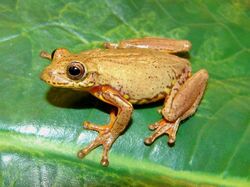Biology:Dendropsophus bogerti
| Dendropsophus bogerti | |
|---|---|

| |
| Scientific classification | |
| Kingdom: | Animalia |
| Phylum: | Chordata |
| Class: | Amphibia |
| Order: | Anura |
| Family: | Hylidae |
| Genus: | Dendropsophus |
| Species: | D. bogerti
|
| Binomial name | |
| Dendropsophus bogerti | |
| Synonyms[3] | |
| |
Dendropsophus bogerti is a species of frog in the family Hylidae. It is endemic to the Andes of Colombia and occurs in the Cordillera Central in Antioquia, Caldas, and Chocó Departments.[1][3][4] The specific name bogerti honors Charles Mitchill Bogert, an American herpetologist.[2][5] Soon after its description in 1970, it was relegated to synonymy of Dendropsophus carnifex, but its species status was restored in 1997.[3][6]
Description
In a sample from Chocó, three adult males measure 25–26 mm (0.98–1.02 in) and an adult female measures 31 mm (1.2 in) in snout–vent length (SVL).[7] In a sample of 11 adults (no sex specified), including the holotype, SVL varied between 31 and 34 mm (1.2 and 1.3 in).[2] The snout is short and rounded. The tympanum is very indistinct. The fingers are webbed at the base, whereas the toes are slightly more than one-half webbed.[2] Coloration is sexually dimorphic: males have dull yellowish green dorsal surfaces of body and limbs, while these are pale golden brown or beige in females. The concealed surfaces of the limbs are bright orange. The throat bright yellow and the belly and posteroventral part of flanks are pale brownish yellow. The iris is coppery.[6]
The tadpoles have an ovoid body that is wider than it is tall. Body coloration is dark brown with blue, gold, and purple iridescence anteriorly and with golden spots on dorsally. The fins are coppery brown. The tail is xiphicercal[6] (i.e., narrowing abruptly to a distinct flagellum[8]). Tadpoles of Gosner stage 34 measure 14–15 mm (0.6–0.6 in) in body length, or about 41% of the total length.[6]
Habitat and conservation
Dendropsophus bogerti is an adaptable species found in open areas such as secondary forest and pastureland at elevations of 1,500–2,580 m (4,920–8,460 ft) above sea level. The eggs are deposited in temporary or permanent pools. This very common species is not facing any known threats. Nevertheless, it has not been recorded in protected areas.[1]
References
- ↑ 1.0 1.1 1.2 IUCN SSC Amphibian Specialist Group (2018). "Dendropsophus bogerti". IUCN Red List of Threatened Species 2018: e.T55417A85900256. doi:10.2305/IUCN.UK.2018-2.RLTS.T55417A85900256.en. https://www.iucnredlist.org/species/55417/85900256. Retrieved 18 November 2021.
- ↑ 2.0 2.1 2.2 2.3 Cochran, Doris M.; Goin, Coleman J. (1970). "Frogs of Colombia". Bulletin of the United States National Museum 288: 1–678. http://www.biodiversitylibrary.org/item/32604. (Hyla bogerti: p. 261–264)
- ↑ 3.0 3.1 3.2 Frost, Darrel R. (2021). "Dendropsophus bogerti (Cochran and Goin, 1970)". Amphibian Species of the World: An Online Reference. Version 6.1. American Museum of Natural History. doi:10.5531/db.vz.0001. https://amphibiansoftheworld.amnh.org/Amphibia/Anura/Hylidae/Dendropsophinae/Dendropsophus/Dendropsophus-bogerti.
- ↑ Acosta Galvis, A. R. (2021). "Dendropsophus bogerti (Cochran & Goin, 1970)". Lista de los Anfibios de Colombia: Referencia en linea V.11.2021. https://www.batrachia.com/orden-anura/hylidae-132-spp/dendropsophus-bogerti/.
- ↑ Beolens, Bo; Watkins, Michael; Grayson, Michael (2013). The Eponym Dictionary of Amphibians. Pelagic Publishing. p. 26. ISBN 978-1-907807-42-8. https://play.google.com/books/reader?id=QJY3BAAAQBAJ&pg=GBS.PA26.
- ↑ 6.0 6.1 6.2 6.3 Kaplan, Moises (1997). "On the status of Hyla bogerti Cochran and Goin". Journal of Herpetology 31 (4): 536–541. doi:10.2307/1565606. https://www.jstor.org/stable/1565606.
- ↑ Palacios-Rodriguez, Pablo; Rengifo-Mosquera, Jhon Tailor; Echavarría-Renteria, Jonard David (2013). "Primer reporte de Dendropsophus bogerti (Anura: Hylidae: Hylinae) en el departamento del Chocó, Colombia". Revista Biodiversidad Neotropical 3 (2): 127–130. https://dialnet.unirioja.es/servlet/articulo?codigo=5168126.
- ↑ McDiarmid, Roy W.; Altig, Ronald (1999). Tadpoles: The Biology of Anuran Larvae. University of Chicago Press. p. 28. ISBN 978-0-226-55762-5. https://books.google.com/books?id=77fPT1qk_9AC&pg=PA28.
Wikidata ☰ Q2702721 entry
 |

